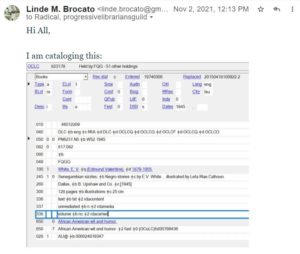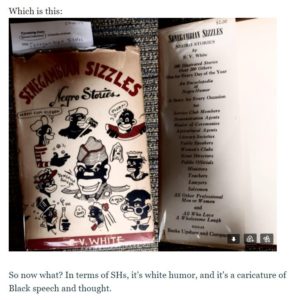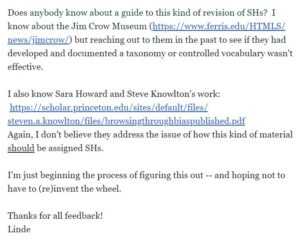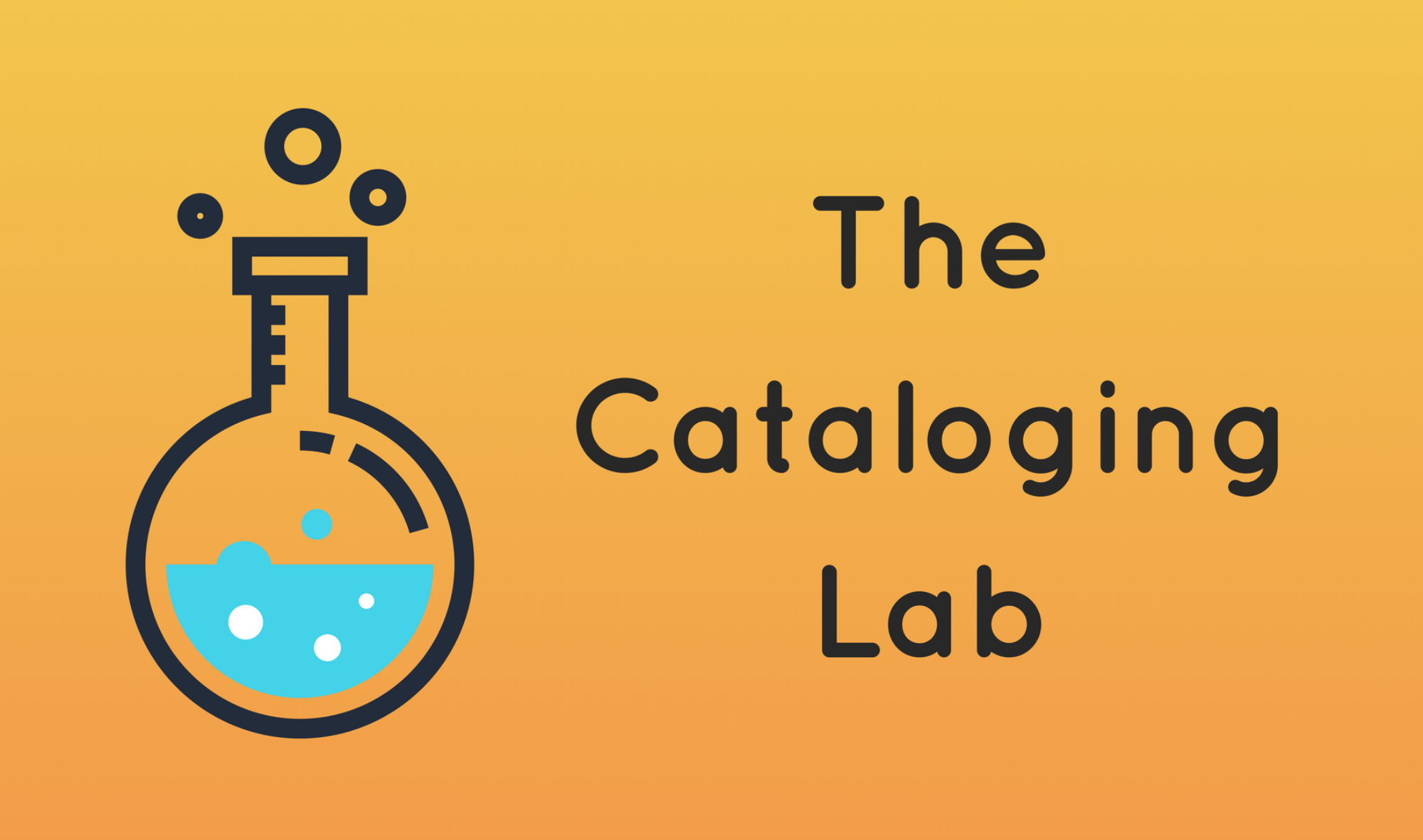Greetings!
This post combines all the above, i.e. issues of subject headings and of CNs, in response to a query I posted about a fairly egregious case of racist humor and racist cataloging.
It also reveals, on further thought, the problems with the “objectivity” dictum of H180:
14. Objectivity. Avoid assigning headings that label topics or express personal value judgments regarding topics or materials. Individual cataloger knowledge and judgment inevitably play a role in assessing what is significant in a work’s contents, but headings should not be assigned that reflect a cataloger’s opinion about the contents. Consider the intent of the author or publisher and, if possible, assign headings for this orientation without being judgmental.
Follow stated intentions of the author or publisher in such matters as readership, audience level, treatment as fact or fiction, etc.”
https://www.loc.gov/aba/publications/FreeSHM/H0180.pdf
This policy disallows recognizing and signalling implicit and systemic bias and prejudicial treatment. It assumes good faith on the part of the author or publisher, and (shall we say) social good faith more generally, on the part of author, publisher, cataloging norms, and cataloger.
Neither personally nor professionally do I believe that “objectivity” has to stand within the values and perspective of the author, particularly with egregious bias and bad faith on clear display.
I include my original post to RadCat and Progressive Librarian’s Guild, and then include a summary of the responses within the thread:



RADCAT Responses to Brocato’s Inquiry about Racist Materials
Inquiry posted to RADCAT Tuesday 2 November 2021
.N-cutter changes on ClassWeb: https://classweb.org/approved/2106.html
SHs
- Blackface [since it covers all types of Blackface portrayals, including artistic and literary]
- African Americans $v Caricatures and cartoons.
- African Americans in literature.
- Racism in literature.
- Racism against Blacks.
- and possibly the genre term 655 \7 Caricatures. $2 lcgft
- “African Americans $v Humor” and probably “Racism $v Humor.”
- “655_0 Racism in literature”
Michael Gorman suggested “African Americans – Racist stereotypes”, but Julie Moore pointed out that that’s not a SH, and that LCSH has used “stereotype” very cautiously:
- Stereotypes (Social psychology)
- Noble savage stereotype
- Model minority stereotype
- Strong black woman stereotype
I believe the last 2 are relatively new.
From Julie Moore at Fresno State:
I am also going to change the .O numbers (=Orientals) even though that has not officially been changed yet at LC. Being Japanese American, myself, I have always cringed (on a personal level) when I have seen the .O numbers. In most cases, for the .O numbers I can use a cutter for Asian Americans. There are also areas where I will be able to break it down further.
Activities
RBMS Controlled Vocabularies has a subgroup working on proposals for an expansion and revision to the prejudicial materials section of the vocabulary. These terms have not gone through the review process yet so cannot be used, but one of the proposals is for “Racist caricatures” and so in the future that will hopefully be an option. They’re apparently working on expanding Prejudicial works terms, like “Blackface minstrel jokes” and “Racist caricatures.” Not sure when this will come out officially, but it’s promising-sounding, if you don’t mind using vocabularies other than LCSH (I know some libraries keep only LC-based vocabularies in bibliographic records).
Resources
Sanford Berman’s work was of course foundational: http://www.sanfordberman.org/
Dorothy Berry’s work on describing minstrelsy collections: https://www.dorothy-berry.com/minstrel-description (This is a great project and post!)
African American SACO Funnel
Another project that someone pointed me toward is Shelby Daniels-Young’s, so I reached out to her, and she responded most generously:
I’m always glad to hear about someone doing similar work! The project I’m working on is to revise the finding aid for a collection of about 500 postcards and trade cards from the late nineteenth and early twentieth centuries, nearly all of which contain stereotypes of Black people. The original finding aid used folder labels that took a more “neutral” route in the content list (“Music”, “Women”, “Children”, etc) so we’ve been working on reorganizing the collection completely and having folder names that explicitly list the types of harmful imagery found in the materials (Mammy stereotypes, Southern nostalgia, Food racism, Caricatured speech). It’s been a combination of research into the history of stereotypes and consulting the faculty members on our team, since we couldn’t find any controlled vocabularies that would do what we were looking for. I see you looked into the Jim Crow Museum–their website was one of our first points of reference.
I don’t have much to link to on my end, since this is still a work in progress, but I can certainly answer any other questions you might have and am fine with being listed as someone thinking about how to describe these types of materials.
Shelby Daniels-Young (she/her/hers)
Pauline A. Young Resident Affiliate Assistant Librarian
Special Collections, University of Delaware Library. Museums and Press
sdanyou@udel.edu
Mark Ehlert has created a report you can run in Alma Analytics:
Alma: /Shared Folders/Community/Reports/Consorita/MNPALS/Resources & Collections. It is called “Project – .Nx Cutter Tracker (Regex)”
Practical Aspects
Be aware that the motion picture classes and the general poetry classes tend to be where you may need to do some significant shifting in the stacks.
Contributors of the above content:
- Bobby Bothmann
- Mark Ehlert
- Michael Monaco
- Deborah Tomaras
- Julie Moore
- Shelby Daniels-Young
- Madeline Douglass
